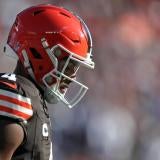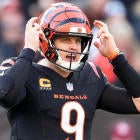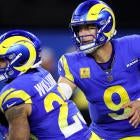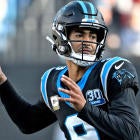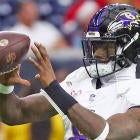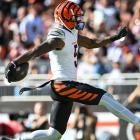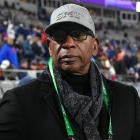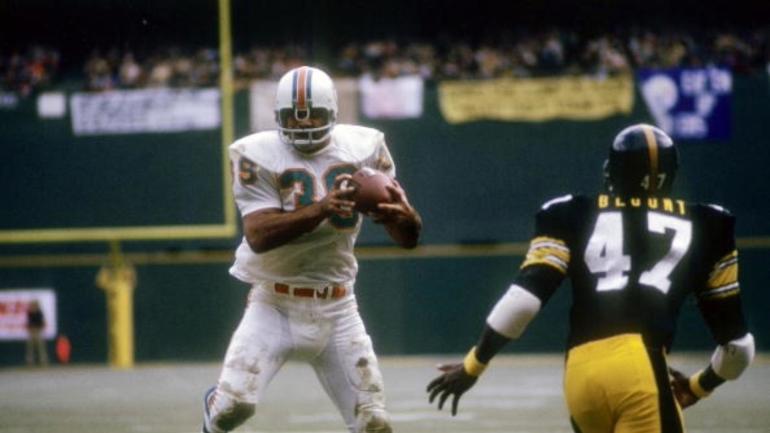
The 1972 Dolphins' perfect season will be celebrated on Sunday night in a home game against the Pittsburgh Steelers. Ironically, It was the Dolphins that had to travel to Pittsburgh for the 1972 AFC Championship Game, despite Miami going undefeated during the regular season.
Back then, the home teams in the playoffs were decided based on a yearly divisional rotation. The only exception was for wild card teams, who would always play on the road. Within each conference, the three division winners and one wild card team qualified for the postseason. There was no playoff seeding at that time, something that wouldn't be implemented until 1975. That's why the Dolphins, the first team to go unblemished during the regular season, had to face the up-and-coming Steelers (who went 11-3 during the regular season) in Three Rivers Stadium on Dec. 31, 1972.
A week removed from defeating the Raiders in the infamous "Immaculate Reception" game, the Steelers took an early 7-0 lead over the Dolphins, who needed a late touchdown to defeat the visiting Browns the previous week. But after the Steelers' defense forced a Dolphins punt, Don Shula decided to gamble by calling a trick play that would change the complexion of the game.
With Pittsburgh's special teams unit going through the motions, Dolphins punter Larry Seiple took the snap, waited for the Steelers' players to turn downfield, then tucked the ball into his arm while finding room to run on the far sideline. Seiple's 37-yard run, the longest run of the day by either team, set up Larry Csonka's game-tying touchdown.
#DolphinsDidYouKnow #TBT One of the iconic plays in @MiamiDolphins and @NFL history occurred in the 1972 AFC Championship Game when P Larry Seiple took off on a fake punt for a first down. Without that play, there may not have been a Perfect Season. pic.twitter.com/H2r2qSgsjk
— Columnist, Phins com (@PhinsChris) August 30, 2018
"From the game film we had seen, when they ran a certain return, everybody would hit and then they would peel to the outside," Shula told NFL Films in a documentary of the '72 Dolphins, "and as Larry stepped up, he saw them starting to peel, not paying any attention to him. So he just followed them as they peeled to the outside."
"I remember standing down on the sideline and hearing the Steelers fans screaming, 'Turn around!'" recalled Csonka, who combined with fellow running back Mercury Morris to rush for 144 yards against Pittsburgh's Steel Curtain defense.
"It was a big play, a big turning point in that game," added Dolphins defensive lineman Manny Fernandez.
While Seiple's run gave the Dolphins a spark, they still needed more from their offense. At intermission, with the score tied, Shula made another change when he benched quarterback Earl Morrall, who was 10-0 as a starter that season, in favor of Bob Griese, who had missed most of the year after suffering a broken leg and a dislocated ankle during the fifth game of the season.
"One of the toughest decisions I ever had to make in my coaching career," Shula said of his decision to bench Morrall, his quarterback in Baltimore when the Colts were upset by Joe Namath and the Jets in Super Bowl III. "I looked him in the eye and he looked right back at me and said, 'Coach, I don't agree with you, I wanna go back in, but I respect your decision.' That's the kind of guy that he was. Griese went in and threw the pass to Warfield that got us going and gave us that spark that we needed to win the game."
Griese's 52-yard completion to receiver Paul Warfield set up the first of two touchdowns by running back Jim Kiick, as the Dolphins turned a 10-7 deficit into a 21-10 lead. And while the Steelers would score a late touchdown, it wasn't enough, as the still perfect Dolphins left Pittsburgh with a 21-17 victory.
While three of the first six Super Bowls were played at Miami's Orange Bowl (the Dolphins' home stadium at the time), Super Bowl VII would be played at the Los Angeles Coliseum, the site of the first-ever Super Bowl. And despite entering the game with a 16-0 record, the Dolphins were three-point underdogs against a Washington team that lost three games during the regular season. A likely reason why the Dolphins were underdogs was the fact that Shula was 0-2 in Super Bowls entering Super Bowl VII. A year earlier, Miami scored just three points in their loss to the Dallas Cowboys in Super Bowl VI.
"I'm sitting there with a reputation of a coach that can win but he can't win the big game," Shula recalled. "And you don't want that ever said about you when you're in the coaching profession."
While completing their regular season -- and avenging their loss in Super Bowl VI -- was motivation enough, the desire to give Shula his first Super Bowl gave the Dolphins' players an extra incentive to beat the Redskins.
"There was no way he could get to another Super Bowl and lose," Fernandez said. "Not Don Shula. If you know the man at all, you just know, that couldn't happen, wouldn't happen, wasn't gonna happen, end of story. We were gonna win that ballgame."
The Dolphins would not lose this one. Led by Csonka's 112 rushing yards, Fernandez's 17 tackles, and game MVP Jack Scott's two interceptions, the Dolphins defeated the Redskins, 14-7. And while Miami successfully defended their title in 1973 (they played both of their playoff games at home this time), their 17-0 season remains their crowning achievement.
"One time, one place in the universe, one space, was occupied by perfection," Csonka said of Miami's perfect season, "and we got to be a part of it. And I'm damn proud I got to be a part of it."







